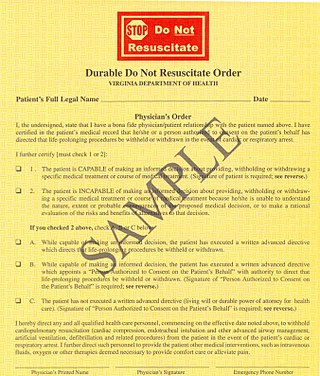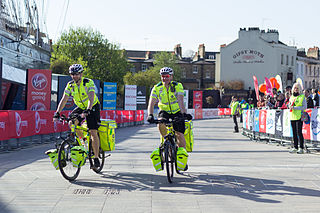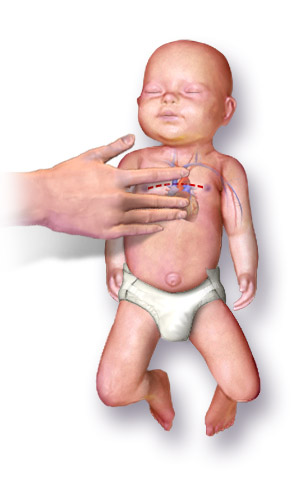
First aid is the first and immediate assistance given to any person with either a minor or serious illness or injury, with care provided to preserve life, prevent the condition from worsening, or to promote recovery until medical services arrive. First aid is generally performed by someone with basic medical training. Mental health first aid is an extension of the concept of first aid to cover mental health, while psychological first aid is used as early treatment of people who are at risk for developing PTSD. Conflict first aid, focused on preservation and recovery of an individual's social or relationship well-being, is being piloted in Canada.

Cardiac arrest, also known as sudden cardiac arrest, is when the heart suddenly and unexpectedly stops beating. As a result, blood cannot properly circulate around the body and there is diminished blood flow to the brain and other organs. When the brain does not receive enough blood, this can cause a person to pass out and become unresponsive. Cardiac arrest is also identified by a lack of central pulses and abnormal or absent breathing.

Cardiopulmonary resuscitation (CPR) is an emergency procedure consisting of chest compressions often combined with artificial ventilation, or mouth to mouth in an effort to manually preserve intact brain function until further measures are taken to restore spontaneous blood circulation and breathing in a person who is in cardiac arrest. It is recommended for those who are unresponsive with no breathing or abnormal breathing, for example, agonal respirations.

Mouth-to-mouth resuscitation, a form of artificial ventilation, is the act of assisting or stimulating respiration in which a rescuer presses their mouth against that of the victim and blows air into the person's lungs. Artificial respiration takes many forms, but generally entails providing air for a person who is not breathing or is not making sufficient respiratory effort on their own. It is used on a patient with a beating heart or as part of cardiopulmonary resuscitation (CPR) to achieve the internal respiration.

A do-not-resuscitate order (DNR), also known as Do Not Attempt Resuscitation (DNAR), Do Not Attempt Cardiopulmonary Resuscitation (DNACPR), no code or allow natural death, is a medical order, written or oral depending on the jurisdiction, indicating that a person should not receive cardiopulmonary resuscitation (CPR) if that person's heart stops beating. Sometimes these decisions and the relevant documents also encompass decisions around other critical or life-prolonging medical interventions. The legal status and processes surrounding DNR orders vary in different polities. Most commonly, the order is placed by a physician based on a combination of medical judgement and patient involvement.

The American Heart Association (AHA) is a nonprofit organization in the United States that funds cardiovascular medical research, educates consumers on healthy living and fosters appropriate cardiac care in an effort to reduce disability and deaths caused by cardiovascular disease and stroke. They are known for publishing guidelines on cardiovascular disease and prevention, standards on basic life support, advanced cardiac life support (ACLS), pediatric advanced life support (PALS), and in 2014 issued the first guidelines for preventing strokes in women. The American Heart Association is also known for operating a number of highly visible public service campaigns starting in the 1970s, and also operates several fundraising events.
Basic life support (BLS) is a level of medical care which is used for patients with life-threatening illnesses or injuries until they can be given full medical care by advanced life support providers. It can be provided by trained medical personnel, such as emergency medical technicians, and by qualified bystanders.

Laerdal is a multinational company that develops products and programs for healthcare providers, voluntary organizations, educational institutions, hospitals, and the military worldwide. Laerdal has over 2,000 employees in 26 countries. The headquarters is located in Stavanger, Norway.

Advanced Life Support (ALS) is a set of life saving protocols and skills that extend basic life support to further support the circulation and provide an open airway and adequate ventilation (breathing).

A bag valve mask (BVM), sometimes known by the proprietary name Ambu bag or generically as a manual resuscitator or "self-inflating bag", is a hand-held device commonly used to provide positive pressure ventilation to patients who are not breathing or not breathing adequately. The device is a required part of resuscitation kits for trained professionals in out-of-hospital settings (such as ambulance crews) and is also frequently used in hospitals as part of standard equipment found on a crash cart, in emergency rooms or other critical care settings. Underscoring the frequency and prominence of BVM use in the United States, the American Heart Association (AHA) Guidelines for Cardiopulmonary Resuscitation and Emergency Cardiac Care recommend that "all healthcare providers should be familiar with the use of the bag-mask device." Manual resuscitators are also used within the hospital for temporary ventilation of patients dependent on mechanical ventilators when the mechanical ventilator needs to be examined for possible malfunction or when ventilator-dependent patients are transported within the hospital. Two principal types of manual resuscitators exist; one version is self-filling with air, although additional oxygen (O2) can be added but is not necessary for the device to function. The other principal type of manual resuscitator (flow-inflation) is heavily used in non-emergency applications in the operating room to ventilate patients during anesthesia induction and recovery.

ABC and its variations are initialism mnemonics for essential steps used by both medical professionals and lay persons when dealing with a patient. In its original form it stands for Airway, Breathing, and Circulation. The protocol was originally developed as a memory aid for rescuers performing cardiopulmonary resuscitation, and the most widely known use of the initialism is in the care of the unconscious or unresponsive patient, although it is also used as a reminder of the priorities for assessment and treatment of patients in many acute medical and trauma situations, from first-aid to hospital medical treatment. Airway, breathing, and circulation are all vital for life, and each is required, in that order, for the next to be effective. Since its development, the mnemonic has been extended and modified to fit the different areas in which it is used, with different versions changing the meaning of letters or adding other letters.

St John Ambulance is a volunteer-led, charitable non-governmental organisation dedicated to the teaching and practice of first aid and the support of the national emergency response system in England. Along with St John Ambulance Cymru, St John Ambulance Northern Ireland, and St John Scotland, it is one of four United Kingdom affiliates of the international St John Ambulance movement.
The chain of survival refers to a series of actions that, properly executed, reduce the mortality associated with sudden cardiac arrest. Like any chain, the chain of survival is only as strong as its weakest link. The six interdependent links in the chain of survival are early recognition of sudden cardiac arrest and access to emergency medical care, early CPR, early defibrillation, early advanced cardiac life support, and physical and emotional recovery. The first three links in the chain can be performed by lay bystanders, while the second three links are designated to medical professionals. Currently, between 70 and 90% of cardiac arrest patients die before they reach the hospital. However, a cardiac arrest does not have to be lethal if bystanders can take the right steps immediately.

Emergency medical services in the United Kingdom provide emergency care to people with acute illness or injury and are predominantly provided free at the point of use by the four National Health Services (NHS) of England, Scotland, Wales, and Northern Ireland. Emergency care including ambulance and emergency department treatment is only free to UK residents and a charge may be made to those not entitled to free NHS care.

Emergency medical personnel in the United Kingdom are people engaged in the provision of emergency medical services. This includes paramedics, emergency medical technicians and emergency care assistants. 'Paramedic' is a protected title, strictly regulated by the Health and Care Professions Council, although there is tendency for the public to use this term when referring to any member of ambulance staff.

The International Liaison Committee on Resuscitation (ILCOR) was formed in 1992 to provide an opportunity for the major organizations in resuscitation to work together on CPR and ECC protocols. The name was chosen in 1996 to be a deliberate play on words relating to the treatment of sick hearts – "ill cor".
The College of Paramedics is the recognised professional body for paramedics in the United Kingdom. The role of the College is to promote and develop the profession across England, Scotland, Wales and Northern Ireland.
GoodSAM is a global emergency and volunteer service platform and associated community co-founded by Mark Wilson OBE, Ali Ghorbangholi OBE and Ali Haddad in 2013. It is used by ambulance, police, fire, government, charity and health services to improve immediate emergency management, largely through video enabling Instant-On-Scene video assessment and from the platform’s ability to alert trusted responders to provide immediate help. It is also the platform used to deploy nearly 800,000 NHS Volunteers across the UK to support those isolating or suffering with Covid

Neonatal resuscitation, also known as newborn resuscitation, is an emergency procedure focused on supporting approximately 10% of newborn children who do not readily begin breathing, putting them at risk of irreversible organ injury and death. Many of the infants who require this support to start breathing breath well on their own after assistance. Through positive airway pressure, and in severe cases chest compressions, medical personnel certified in neonatal resuscitation can often stimulate neonates to begin breathing on their own, with attendant normalization of heart rate.
ReSPECT stands for Recommended Summary Plan for Emergency Care and Treatment. It is an emergency care and treatment plan (ECTP) used in parts of the United Kingdom, in which personalized recommendations for future emergency clinical care and treatment are created through discussion between health care professionals and a person. These recommendations are then documented on a ReSPECT form.















